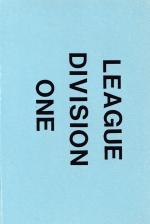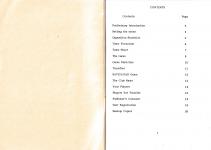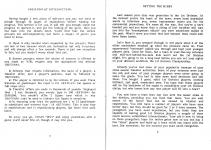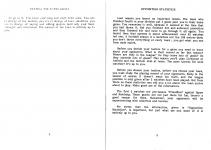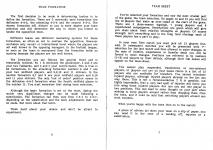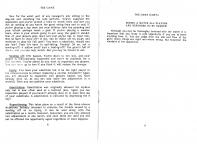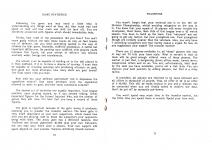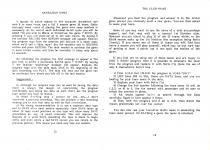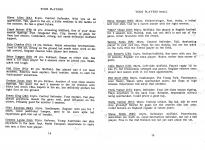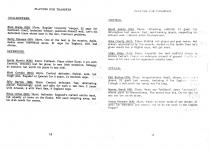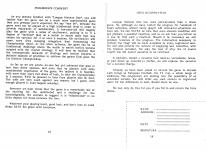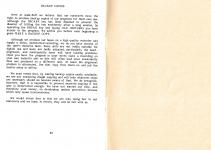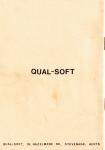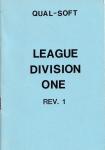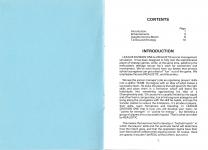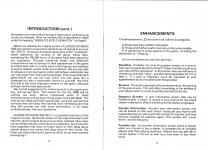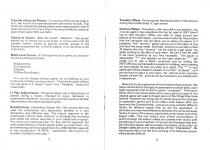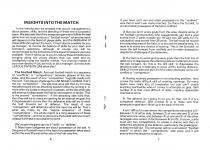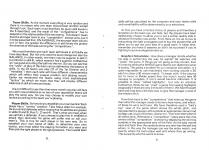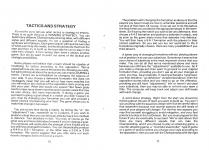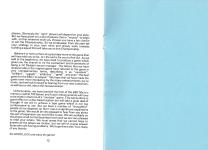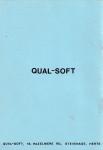| Genre: | Unknown Genre Type |
| Publisher: | Qualsoft |
| Cover Art Language: | English |
| Machine Compatibility: | BBC Model B |
| Release: | Professionally released on Cassette |
| Available For: | BBC Model B |
| Compatible Emulators: | BeebEm (PC (Windows)) PcBBC (PC (MS-DOS)) Model B Emulator (PC (Windows)) |
| Original Release Date: | 11th March 1986 |
| Original Release Price: | £16.20 |
| Market Valuation: | £2.50 (How Is This Calculated?) |
| Item Weight: | 64g |
| Box Type: | Cassette Single Plastic Black |
| Author(s): | - |
Variant Items
There are 0 other items featuring this same game (that we know about!). Click any of them for their details.
Active Auctions
Closed Auctions
Buy It
Unfortunately no-one is currently selling this item.
Auction Price Watch
Worried you're being ripped off? Closing prices on eBay can help you decide what a reasonable price is for a particular item.
Components
This item originally came with the following components:
- Instruction Manual (20 Page Yellow Instruction Manual)
- Instruction Manual (12 Page Blue Instruction Manual)
If scans of components are available, you will find them in the Cover Art section.
Full Instructions
Preliminary Instructions
Having bought a new piece of software you may not want to plough through 20 pages of explanation before running the program. This section is for you. It will tell you enough about the program to operate it, and get the feeling of the game, then you can look into the details later. You'll find that the screen prompts are self-explanatory but there a couple of points you need to know.
- Input is only needed when requested by the prompts. There are one or two screens which are instructive but only temporary and will change after a few seconds. There is just one exception to this, but you needn't worry about that yet.
- Screen prompts, where the choice of answers is offered to you (such as Y/N), require only the appropriate key without RETURN.
-
Screens that require information, the name of a player, a transfer offer, and a player's position, must be followed by RETURN.
- The player is referred to by his initials. If you want Frank Knowles as goalkeeper the input is FK (RETURN) (no spaces or full stops etc.)
- Transfer offers are made in thousands of pounds. Displayed thus: £ xxx thousand, you merely type in 100 (RETURN) for £100,000. You needn't offer three figure sums which is why RETURN must be used to indicate the figure is complete.
- In choosing your team the positions are 1 to 12 (goalkeeper to substitute) and entered thus: 10 (RETURN). This is also true in substitutions and in repositioning players, but leave that until later.
So away you go. CHAIN "DIV1" and enjoy yourselves with a game you'll never tire of, though it may tire you.
Setting The Scene
Last season your club won promotion to the 1st Division. At the moment you're the toast of the town; every local journalist wants to interview you, every businessman wants you for his commercial promotions. It's roses all the way. But you're a hard headed pro and you know that a string of lost matches will turn you into the "incompetant villain" you were sometimes called in the past. What's more you know that last seasons team could well have those losses.
Let's face it, you scraped through in 3rd place when 2 of the other contenders cracked up when the pressure came on. Your experienced "veterans" pulled you through and kept your younger players calm. Good for them, but a team of over-the-top veterans and still-wet-behind-the-ears kids won't set the 1st Division alight. It's going to be a long haul before you can set your sights on your ultimate ambition; the 1st Division Championship.
Already you've lost some of your popularity because of your close season transfer activities. Some of your veterans were just too old, and some of your younger players were never going to make the grade. You had to take some hard decisions and sell them. You bought 3 good, solid 1st Division players; nothing brilliant, just good, consistant pros. You hope that these players will be the backbone of the squad to consolidate your 1st Division status; but who knows how any new player will fit into a team?
You now have a team that can live with the lesser clubs in the division, providing you can field that team. You are well aware of the havoc that can be caused by injuries and suspensions. You still have a number of players who have seen better days, but they should be good for 2 or 3 more seasons. The youngsters you have need experience, but you think they are capable of making good 1st Division players; a couple of them could become established internationals. Your job is now to bring on these youngsters; hope for better gates now so you can buy a few "class" players and build up a team which can stand with the best. But remember, for the moment you must avoid relegation.
So go to it. You know your long and short term aims. You are in charge of the tactics; you are in charge of team selection; you are in charge of buying and selling players (and only your Bank Manager can intervene). The success of the team is entirely up to you.
Opposition Statistics
Last season you learnt an important lesson. The team who finished fourth in your division put 5 goals past you in their home game. You remember it well, because it seemed at the time that you had blown it. But you finished 3rd and achieved promotion and they finished 4th and have to go through it all again. You learnt then that success is about achievement over 42 matches not one. A football season is a marathon not the 100 metres dash; you don't throw everything at every team; you get what you can from each match.
Before you decide your tactics for a game you need to know about your opponents. What is their record so far this season? Where are they in the league? Do they score lots of goals? Do they concede lots of goals? This season you'll play Liverpool at Anfield and the bottom club at home. The same tactics for both matches? It's up to you.
Before you choose your tactics, before you choose your team, you must study the playing record of your opponents. Early in the season of course it doesn't mean too much, and the league position is only given after 5 matches have been played. But from there on these statistics can tell you a lot about the team you're about to play. Make good use of the information.
The first two matches are pre-season "friendlies" against Spurs and Hamburg. These games are not just there for fun, there's a good reason for them. Remember, your opponents will be experimenting with selection and tactics.
We stress that the information, given in "Opposition Statistics", is important, but just what use you make of it is entirely up to you.
Team Formation
The first decision to be made in determining tactics is to define the formation. There are 3 commonly used formations: the defensive 4-4-2, the attacking 4-2-4 and the neutral 4-3-3. The chosen formation will dictate to you to some degree your team selection and will determine the way in which you intend to handle the opposition team.
Different teams use different numbering systems for these formations, as often as not to confuse the opposition. However confusion only occurs at international level where the players are not well known to the opposing managers. In the football league, as soon as the team is announced then the formation holds no mystery because the players are too well known.
The formation you use follows the general trend and is reasonably rational. No 1 is obviously the goalkeeper, 2 and 3 are your two full backs, and 4 and 5 your centre-backs. This is true in all formations. In the attacking formation numbers 6 and 7 are your two midfield players, and 8,9,10 and 11 strikers. In the neutral formation 6,7 and 8 are your midfield players and 9,10 and 11 your strikers. The only "out of order" position comes in the defensive 4-4-2 formation when the fourth midfield player is the number 11. You must remember that during team selection.
Although the basic formation is set at the start, during the match very significant changes can be made following a substitution. The formation can then vary from 7-2-1 to 1-2-7, depending on the substitution and the team adjustments that can be made. But more about that later.
Think hard about your choice and don't be afraid to experiment.
You've selected your formation and now the most crucial part of the game; the team selection. On pages 14 and 15 you will find the 18 players that make up your squad at the start of the game. There are 3 close-season signings, 7 young players and 8 experienced campaigners. Descriptions are given which will give you clues about their relative strengths as players. Of course strength isn't everything and in the long term strategy each of these players has a part to play.
In your very first match you must pick all 12 players (inc. sub). In subsequent matches you will be presented with the selection for the last match and then allowed to make changes. In the case of injuries, suspensions or transfer deals you will be forced to make changes. Positions are referred to by numbers (1-12) and players by their initials, although their full names will appear on the team-sheet.
You cannot play suspended, transferred, or players, or players not yet on your books (there is a list of 12 players who are available for transfer). You cannot introduce injured players, although injured players already on the list can stay there. This is not a recommendation!! It is possible, but highly improbable, that a very bad spell of injuries will force you into using those injured players. Nor can you put one player in two positions. This can lead to some thought on your part when wishing to move players around rather than dropping them from the team, and it must be said that switching players around can work wonders.
When you're happy with the team then on to the match!
A piece of advice: jot down your team on a slip of paper, you may need it in the case of a sending off, injuries or a substitution.
The Game
Now for the worst part of any manager's job; sitting in the dug-out and watching the lads perform. You've analysed the opposition and you've picked a team to match them and now you can do nothing as you watch the game swing from end to end. If you're playing a top team can your defence take the pounding and your attack perhaps sneak a goal. If you're playing a weaker team, when is your attack going to put away the goals it should. One of your players goes down and your physio has to treat him. Will he have to come off? If not, can he shake off his injury and continue to play his full part? You have a substitute, should you use him? Then it's back to nail-biting. Trouble! Oh no, not a sending-off! A yellow card? Just a ticking-off? The game's full of drama, and you can only watch. But you may be forced to act.
Sending Off:
It'll happen. You're down to ten men, and your player is automatically suspended and won't be available for a few matches. You're asked do you want to reposition any players. You can nove up to two if you think it will reduce the damage.
Injury:
You have your substitute but is he the right player in the circumstances (a striker replacing a central defender!)? Again you are allowed to reposition two players (unless you have already done so, as you can only make two adjustments in a match!). Then you can position your substitute.
Substitution:
Substitution was originally allowed for injuries only but is now often used as a tactical ploy. Again you can reposition players if you haven't already done so to make best use of your substitute. A substitution is initiated by depressing the key!
Repositioning:
This takes place as a result of the three abvove situations. Initially intended to minimise the trouble caused by a sending off or on injury, it can be used along with the substitution as a tactic. However, remember, you are only allowed two adjustments in one match, and once those are used you will not be offered the opportunity again regardless of what happens.
DURING A MATCH ALL PLAYERS ARE REFERRED TO BY NUMBER!
Although you may be thoroughly involved with the match it is important that you study it with objectivity if you are to learn anything from it. You can judge from the ebb and flow of the game where things are right and where wrong. But remember the standard of the opposition.
Game Statistics
Following the game you may need a little help in understanding why things went as they did. How much was luck (good or bad) and how much was skill (or lack of). You are therefore presented with figures which should immediately help.
Firstly, how much of the possession did you have? You can't score goals without the ball. Some teams do rely on fast breaks out of defence, but you need something special in the way of strikers for that game. Secondly, midfield possession. A subtle but important difference. By packing your midfield with players you'll increase this figure, but your attack or defence may become woefully weak. Swings and roundabouts.
The attack must be capable of holding on to the ball played to it from midfield, if it is to have a chance of scoring. It must then be capable of creating openings and producing attempts on goal. How good are these attempts, how many shots are goal bound? The final score tells you that.
How well has your defence performed? Did it dispossess the opposition attack? How many attempts were the opposition allowed to make on goal, and how many successful attacks?
The second set of statistics are equally important. Your league position, your playing record, as if you needed telling. Other important figures for the future! Injuries! Who, and the number of games they will miss. It's best that you keep a record of these figures.
The gate is important because of the gate money it produces, allowing you to plunder the transfer market. The home gate is very much dependant on your own supporters, which means how well you are playing. Add to those the supporters your opponents bring with them. The away gate has a different balance. Old Trafford can almost guarantee 40,000 plus your own followers, but you only play there once a season. Your own support will again depend on your success. Success definitely breeds success.
You musn't forget that your eventual aim is to win the 1st Division Championship, whilst avoiding relegation on the way to it. You know that your squad of 18 players will never trouble the Liverpools, West Hams, Man Utds of this league over a 42 match season. You have to build up the team. Your "veterans" are not going to get any better, but your youngsters are. Your youngsters though are initially weaker than the veterans. Also, you only have 7 promising youngsters and that hardly makes a squad. So how do you supplement your squad? The transfer market!
There are twelve players available to, all "class" players who may or may not fit into your team style. What is certain is that no team will be good enough without some of these players. The market is just that, a bargaining place; offers made, turned down, compromise offers and so on. You are, unfortunately, held back by the cash you have available, you're not a rich club. You can improve your cash position by selling players, but that is a risky tactic.
You won't spend very much time in the transfer market, but the little time you spend there is crucial. Spend your time well.
Save/Load Game
A typical 42 match season in this computer simulation can take 6 or more hours, and a full 5 season game 30 hours. Quite obviously some means of playing the game over many sessions is necessary. At the end of each individual match cycle you will be asked "Do you wish to (S)ave or (C)ontinue the game? (S/C)". By pressing C you will continue on to the next match. By keying S the familiar RECORD then RETURN message will appear. Remove the program tape from the cassette unit and put in a blank tape, which we'll call a "data tape". Set the cassette unit in RECORD motion and press RETURN. The data needed to continue the game in some future session will then be recorded. It takes only about 15 seconds.
On CHAINing the program the first message to appear is "Do you wish to LOAD a previously SAVED game? (Y/N)". By keying Y the familiar "searching" message will appear. Replace the program tape with the data tape, wind to the beginning of the data recording, and PLAY. The data will load and the game can be continued from where you left off in the last session.
Suggestions:
- Although the program tape can be used for saving the data there is always the danger of overwriting the program accidentally and losing the data as well. Don't use the program tape unless you have no choice.
- When SAVEing data a second (or 3rd, 4th....) don't overwrite a previous recording. This can produce a bad recording causing you to lose that data as well as that overwritten.
- My strong recommendation is to use a seperate data tape and to SAVE after each session seperately. Each SAVE takes up about 10 tape count positions so one tape will allow many SAVE procedures at, say, 15 count intervals. This will improve the chances of a good SAVE (assuming the tape is blank to begin with), and even where a bad SAVE occurs you can return to the previous position. This means you need only lose one session.
The Club Name
Whenever you load the program and answer N to the LOAD game prompt you obviously start a new game. You are then asked to name your team.
Some of you may want to use the name of a club you perhaps support, and that may well be a current 1st Division club. However you are about to play 21 of the 22 teams which, in the 83/84 season make up the 1st Division (the exception being Notts County). If you chose one of these 21 teams you will find that twice a season you will play yourself, which may be one sure way of getting at least 4 points but it can spoil the realism of the game.
If you feel set on using one of these teams and are happy to EDIT a BASIC program then it is possible to eliminate the team from the program and replace it with Notts Cty (note the use of only 9 characters). Here's how:
- First LOAD (not CHAIN) the program ie LOAD "DIV1"
- LIST lines 200 to 350; these are DATA lines, and you are looking for your team name in the data.
- Replace your team with Notts Cty
- Change the 2nd number following the team name (it will be 1,2,3, or 4) to 2. Use the normal edit procedure and be sure to retain the commas in place.
- All teams appear twice SO search through the lines carefully; Spurs in fact appear 3 times.
- Then RUN the program and if all is O.K. then SAVE the result, preferrably not over the master.
You can now use your favourite club's name in answering the team name prompt. On SAVEing a game the name is retained.
Your Players
Steve Allen (SA): 21yrs. Central Defender. With you as an apprentice. Tall, good in the air, a little reckless in the tackle at the moment. He has a great future.
Frank Barnes (FB): 25 yrs. Attacking Midfield. One of your close season signings from relegated Man. City. Scored 14 goals for them last season. Consistant, strong, but needs defensive midfield support.
Pete Charles (PC): 19 yrs. Striker. Welsh school boy international. Good in the air, strong on the ground but needs some work on his ball control. Regular reserve team player last season. 30T
Brian Duggan (BD): 29 yrs. Full back. Happy on either side. Has been a 1st team player for 3 seasons since he joined you. Small, quick and tough. 45
Phil Giles (PG): 20 yrs. Midfield. Has played just 8 1st team matches. Reserve team captain. Hard tackler, needs to curb his "enthusiasm" sometimes.
Graham Jones (GJ): 26 yrs. Striker. Another of your close season signings. Has spent the last 5 seasons in the 1st Division with Stoke and Aston Villa. Superb in the air, but definitely prefers his right foot on the ground.
Jimmy King (JK): 31yrs. Central Defender. Your captain. Can play 5 almost anywhere. Reads the game well, good influence on the others. Probably good for another 3 seasons. 357
Mike Knowles (MK): 31yrs. Goalkeeper. Regular with you for 7 years. Good positional 'keeper, used to be more ajile but experience gets him out of trouble. 407
Graeme Lyons (GL): 22yrs. Defence. Young Australian can play anywhere in the back four. Needs European experience to make him into a first rate player.
Steve Morgan (SM): 30yrs. Striker/winger. Fast, tricky, a lethal left foot shot. Can be a match winner with the right service. 86T
"Ollie" Olsen (OO): 29yrs. Midfield. Has played in English football for 5 seasons now. Skillful, cool, but can drift in and out of the game. Great favourite with the crowd.
Sammy Parks (SP): 30yrs. Central Defender. Tall, dominating player in your own box. Plays his man closely, but not too quick on the turn. Still the fittest player on the field.
Jim Roberts (JR): 31yrs. Striker/midfield. Has been with you for 12 seasons. Regular 1st team player. Maker, rather than scorer of goals. OT
Colin Slater (CS): 22yrs. Left-side midfield. Played rugby 'til he was 15, but tremendous strength and power. Regular reserve team 30 T player last season with 15 1st team appearances.
Phil Stott (PS): 20yrs. Goalkeeper. The Young Turk. Flamboyant, even flashy. Makes some spectacular saves, but flaps at high 207 crosses. Experience will solve that problem.
Chris Turner (CT): 24yrs. Defender. Your 3rd close season signing. Plays anywhere in the back four. Reliable, dependable without being spectacular. Could prove a good buy.
Wally Vernon (WV): 20yrs. Central striker. Big lad, will he ever stop growing? Scored 22 goals for the reserve side last year. Could become an England regular in future years. 351
Steve Willis (SW): 31yrs. Defensive midfield. Powerhouse, sometimes too much so. Good destructive defender, but not a ball player. Fine in the 2nd Division but not yet sure about the 1st.
Players For Transfer
Goalkeepers
Stan Burns (SB): 27yrs. Regular Coventry 'keeper, 22 caps for Scotland. Good, technical 'keeper, positions himself well. Let's his defenders know whose boss in the box. Contract problems.
Barry Stevens (BS): 28yrs. One of the best in the country. Agile, makes some incredible saves. 31 caps for England, still 2nd 201 choice.
Defenders
Keith Martin (KM): 24yrs. Full back. Plays either flank. yrs with Everton, recently lost his place to new Irish sensation. Unhappy at moment, but worth his place in any side.
Mick Gordon (MG): 26yrs. Central defender. Stylish, cool, but tough also. Regular at Ipswich for 4 years, 12 Scottish caps.
Billy Barton (BB): 26yrs. Central defender. Tall, dominating player. Surprisingly quick and ajile for such a tall man. 2 years with Arsenal, 4 with West Ham. 8 England caps.
Brian Orton (BO): 24yrs. Defender. England's current centre back, but equally at home on the flanks. Will need tempting away, but his club needs the money.
Midfield
David James (DJ): 24yrs. Attacking midfield. for 15 goals Birmingham last season. Fast, hard-running player, supporting his 3 strikers well. Current Welsh international.
Mike Cherry (MC): 23yrs. Skillful ball player and goal maker. Not always appreciated by the crowds. Harder in the tackle than he's given credit for. 6 English caps, will get more.
Allan Miles (AM): 26yrs. Arguably the best midfield player in British football. Covers an enormous amount of ground. Equally at home in his own and his opponents penalty area.
Attack
Phil Norton (PN): 27yrs. Winger/striker. Small, clever, right-sided player. 22 goals last season, including 6 for England. Going through a bad patch but surely not for long.
Sammy Sands (SS): 25yrs. Some say "brilliant", some "mercurial", others point to inconsistancy. The crowd love him. On his day he can win the match alone.
Kenny Stewart (KS): 24yrs. Wants to come south of the border. 31 goals for Aberdeen last season, can he do the same in the English league?
Publisher's Comment
As you become familiar with "League Division One", you will realise that the game can be a much more sophisticated game than you perhaps you'd expected. We say "can be", because the game need not be played at a high intellectual level in order to provide enjoyment or satisfaction. A ten-year-old will happily play the game with a sense of excitement, putting in to it a degree of "tactical" play on a match to match basis that may ensure his survival for 3 or even 4 seasons. His excitement will come more from escaping relegation than threatening the Championship itself. At the other extreme, the game can be an intellectual challenge where the match to match tactics become coupled with the overall strategy. It will then be realised that the incompatable demands of strategy and tactics requires a delicate balance of priorities to achieve the games final goal; the 1st Division Championship.
As far as we are aware, no-one has yet achieved that goal in less than three seasons, and even that by players with some considerable experience of the game. We believe it is feasible, with more than one's fair share of luck, to take the Championship in 2 seasons. We'll be pleased to hear from players who do that. The odds are very much against one season; but I guess with enough players it must happen someday.
However we must stress that the game is a remarkable mix of the exciting for the uninitiated and a challenge for the knowledgeable. We venture to suggest it is "educational" in no little degree for those between the two.
Whatever your playing level, good luck, and don't lose to much sleep; SAVE the game until tomorrow.
User Registration
League Division One has more permutations than a chess game. So, although we have tested the program for hundreds of hours ourselves, almost every player will encounter situations we have not. We can NEVER be sure that some obscure condition will not produce a peculiar reaction, and so we ask that you inform us if you do find such a reaction. Should it be necessary we will produce revisions of the program. The information necessary to correct the "bug" will be made available to every registered user. We will also provide the service of supplying new cassettes, with the revision included, for only the cost of p&p. We of course expect the old master cassette to be returned.
In addition, should a cassette fail; become unreadable, break, or just finish up covered in coffee, we will replace the cassette for a nominal charge.
Already we have been asked to extend the game to include such things as European football, the FA Cup, a whole range of additions. The originators are looking into the possibility of an extended version. We will offer any such version to registered users for the difference in cost, should there be one.
Backup Copies
Here at Qual-Soft we believe that our customers have the right to produce backup copies of our programs for their own use. Although the ESCAPE key has been disabled to prevent the disaster of hitting the key accidently after a long session, by operating the BREAK key and typing OLD (RETURN) you have access to the program. We advise you before even beginning a game MAKE A BACKUP COPY.
Although we produce our tapes on a high quality recorder and supply a clean, undistorted recording, we do not have control of the user's cassette deck. Some units are not really suitable for digital use and many are badly adjusted, particularly the head alignment, and consequently some will have loading problems. Once you have the program in your micro make a recording on your own cassette unit as this will often load more consistantly than one produced on a different unit. At least the alignment problem is eliminated. Use that copy from there on and put the master away in safety.
We must stress that, by making backup copies easily available, we are not condoning illegal copying and will take whatever steps are necessary should we become aware of that. We do recognise, however, that it is impossible to prevent cassette copying if the user is determined enough. We have not wasted our time, and therefore your money, on developing useless protection devices which only cause inconvenience.
We would stress that in this we are only being fair to our customers and we hope, in return, they will be fair with us.
Revision 1 Introduction
League Division One is a realistic soccer management simulation. It has been designed to fully test the sophisticated player of strategy games, while, at the same time, satisfying the enthusiastic teenage soccer fan's wish for excitement and involvement. We've even found from our letters that primary school youngsters can get a deal of "fun" out of the game. We emphasise the word 'realistic', and this is why:
We see the soccer manager's job as organising players' skills into a skillful TEAM. He begins with an idea of what makes a successful team. He picks the players that will give him the right skills and plays them in a formation which will blend the individuals into something approaching his idea of a Championship side. Of course he's usually limited by his squad and often has to compromise, but in his long term stategy he will bring along the youngsters with the skill he needs, and use the transfer market to reduce the limitations. It's all about players, their skills, team formations and blending. In League Division One that is how you will develop your team; no "points for strength" or "points for energy", but blending a group of players into a successful squad. That is what we mean by 'realistic'.
This means that we have had to develop a "football match" in which the players' skills and the particular blend will determine how the match goes, and that the opposition teams have their own blend which reflects their playing record. Of course, there are upsets; it wouldn't be REAL without them, but over a full season your team will performas it deserves to, and that is up to you as manager. How we achieve this is described in detail under the heading "INSIGHTS INTO THE MATCH" on Page 6.
Before we released the original version of League Division One we carried out several hundred hours of testing to sort out the "DATA" on players and teams and many of the "constants" which determine the running of the game. Since then, something like 100,000 hours of the game have been played by our customers. Through numerous letters and telephone conversations we've learned of their experiences of the game and have been able to modify some of the figures and statistics to ensure realistic results under all conditions. We are now able to release a multi-level game which will behave realistically (we can't get away from that word) at all levels. This means that each game-player can use the level which not only gives him a challenge but also a reasonable chance to succeed. We think that this is the most important revision to the game, although perhaps not the most spectacular.
We invited suggestions for enhancements to the game and, boy, did we get them. The version for the ICL 2980 will be coming out soon. We've introduced some of these enhancements until we have hit the stops on the 32k Beeb. The next section deals with them specifically, we'll just say here that we hope they will make the matches more interesting and that they will provide you with more information, in an easily understood way, than you had before.
League Division One:REV1, is a sensible evolution of the original concept. All the information in the original booklet is still relevant; all the original features have been retained. New users can go ahead and play unhindered by predjudice, but those who have upgraded may have to forget some of their ideas about certain players and teams (and drop some of their tricks). We hope you enjoy playing the game as much as we have enjoyed developing it.
Enhancements
The enhancements, 22 we count in all, fall into 3 categories:
- Those which are visible to the player.
- Those which affect performance but otherwise invisible.
- A tightening of some aspects of the game, including the elimination of "cheating".
Let's try and speed our way through them.
-
Penalties.
Probably the time of greatest tension in a match, how can any game be without them? These now fall to both your own side and the opposition. In the former case you will have to choose your penalty "king", and then hit the spacebar for him to take it. If a goal is important you'll be surprised at your apprehension as you're poised over the spacebar. -
Scorers.
The most requested of the enhancements, the naming of the goal scorers. This will reflect something of the abilities of your players when it comes to putting the ball into the net. -
Season's Scorers.
A new information screen that can be looked at after a match. A record of your scorers for the whole season is displayed. Watch it build up as the season progresses. -
Injuries information.
Another new information screen that can be looked at after each match, listing all your injured and suspended players, along with the number of matches until they become available for selection again. This number will "count down" as matches go by. -
Transfer List.
Yet another information screen which is shown when you choose to buy a player. A complete list of available players with their playing positions. Players that you sell will of course appear in the list as well (you may want to buy them back). -
Transfer of Injured Players.
I'm not sure if this comes under a) or c), but injured or suspended players will receive no bids. That stops you temporarily selling players and replacing them with fit ones only to buy them back when they are available for selection again (that means YOU Jan-Eirik). -
Choice of Action.
After the match "statistics", this screen allows you to choose your next action. It can be entry into the transfer market, access to scoring records, access to the injuries/suspension list, to SAVE a game, or to Continue to the next match. - Multi-Level Games.
At the beginning of a game you are given the choice of 4 levels of play:
4) Apprentice.
3) Competent.
2) Expert.
1) Move Over Bobby!
You cannot change during a game, so no building up your funds at level 4 then moving to level 1. The level that best reflects the real game is 2, Expert. Level 1 is a "Vindaloo" version for masochists. -
In Play Adjustments.
The game allows you 2 adjustments of players during a match, intended for injury, dismissal, or substitution situations. You can now use them purely as tactical adjustments at any point during the game. -
Substitutions.
Interesting change this. One young man has used the substitution and adjustment facilities in a very interesting and effective way. The instant response to the substitution call has been removed to simulate that annoying wait whilst the referee responds to your substitution request. You must now hold down the "S" key until he responds. No more substitutions on the fly exactly when you want them. (It's an interesting point for programmers how BBC BASIC responds to two consecutive "IF GET$." statements. We found it by accident, but like it in this case.) -
Transfer Offers.
The computer has always been a little devious during the transfer deals. It's got worse! -
Dummy Player.
This player, with zero skill in any position, can now be used in two situations (he can be used at ANY time if you're daft enough). When you wish to swap around two players on the team sheet, you have previously had the problem that the computer will not allow you to place one player in 2 positions. This "dummy" player can be put in the place of one and then the swap made. Secondly, should you be able to field 12 players then the "dummy" can be used as a last resort. He gives nothing to the skill of your team. He can if fact be used in as many positions as you find necessary. The player is designated and appears on the team sheet as "*". We chose not to use a blank, produced just by hitting the [RETURN] key as this leads too easily to mistakes, and in testing we have played 10 men too often as a result. The is very easily seen where a blank is missed. It is in fact "no player", so if you do have to use it in your team "he" will not score, become injured, be sent off, and cannot be involved in any substitution or adjustment.
Now quickly through some of the invisible enhancements. We have mentioned the changes of parameters to player skills, team skills (opposition that is) and to certain "constants". This has an effect which will not be observed by new users but users of the original game will need to forget some of the things they have learned. However two things worth mentioning are the changes to opposition tactics and to the effect inthe season after you have won the Championship. Just as you may consider different tactics for different teams then so will the opposition. In particular you may find differences between the home and away tactics of some of the teams, particularly at the lower end of the league table. This can reduce your overall accumulation of points through the season unless you answer their tactics with something to overcome them. If you win the Championship then the following season will be a tough one indeed, as the other 1st Division sides are out to take points off the "Champions". So winning the title is not the end, winning it the following season will be doubly difficult.
Insights Into The Match
In the introduction we stressed that soccer management is about players, skills, and the blending of these into a successful team. We also said that if the computer game is to follow the real game then we must produce a "football match" where the result will depend on the blend of player skills, and the distribution of these skills throughout the team. It must also be possible for you as manager, to control the balance of skills by your team and formation selections, although of course you will be compromised by the limitations of the squad of players you have available. Then it will be up to you to reduce these limitations by bringing along the young players that you need and by intelligently using the transfer market. You must be master of your own destiny if you are truly to be a manager. So how does League Division One allow this?
The Football Match.
Any real football match is a sequence of "conflicts" or "competitions" between players of the two sides, and the result of one "competition" logically leads onto the next. Two players challenge for a 50-50 ball in midfield, that's the 1st "competition". The side that wins will then try to move the ball forward into an attacking position either by running it, or more often by a pass or sequence of passes, whilst the other side will attempt to dispossess the first by interception or tackle. That is the second "competition". If the attacking side wins that, then they will try to create an opening for an attempt on goal, but if dispossession occurs then the defensive side will try to work the ball forward out of defence. The result of one "competition" will determine what the next one will be. That's what we mean by the "logical sequence" of these "competitions". The whole match is a long sequence of these "competitions", and not so obvious is that a side will have to win at least 4 of these in succession to score.
We've split the game up into five "skills" or "abilities":
- Most team ballgames are about possession of the ball. In the game of football most of the fight for possession takes place within the area 30 yards either side of the half-way line. If your team can't win and retain possession in this "midfield" area then it won't win many matches. So this is the 1st skill, to win and retain possession of the ball in midfield.
- But you don't score goals from this area, despite some of the football commentators who exaggeratedly say that a goal scored from 2 yards outside the 18 yard box (20 yards by my calculation) was scored from 35 yards. The ball must be moved into attacking area of the field, in or around the penalty area, if a team is to stand any chance of scoring. This is the 2nd skill; to move the ball forward from midfield and to retain possession despite the challenges of the defenders.
- If a team is to avoid giving away goals then the first line of defence is to dispossess the attacking side as it attempts to work the ball forward. So this is the 3rd skill; to dispossess the attacking side as it attempts to move within scoring distance. Skills 2) of one side and skill 3) of the other obviously come into conflict or "competition".
- Having retained possession in an attacking position, then comes the really difficult skill of creating openings. So many teams have really lots of possession but just can't create anything worthwhile when it comes to attempts on goal. Skill number 4) is that most difficult of skills, creating reasonable chances to score.
-
The defence isn't going to let you do that, not if it is a competent defence. Skill number 5) is to make sure that attempts on goal don't finish up in the back of the net.
It isn't difficult to see where the competitions take place is it? Between 1) of either side, between 2) of one side and 3) of the other and vice-versa, and between 4) of one and 5) of the other (and again vice-versa). In fact between 4) and 5), to score, a side must win two competitions, to create a chance and then to defeat the attempts of the defence, particularly the goalkeeper, to keep the ball out. The computer will run a simulated "football match" in which the competitions" take place and it will ensure that the sequence is logical.
Team Skills.
At the moment everything is very random and there is no reason why one team should beat another except through luck. Each team must therefore be given skill levels in the 5 described, and the result of the "competitions' has to depend on the relative skills of the two teams. This doesn't mean that the stronger team in any "competition" always wins, but it is to be expected that, ON AVERAGE, the stronger team will win out. In fact, the greater the difference in skill levels the greater the chances of that side winning the "competitions".
We must therefore give each team skill levels in all 5 skills we have described. But not only need the level change but also the BALANCE. In other words, one team may be superior in skill 1) but inferior in skill 4); which means it has a superior midfield but isn't as good at putting the ball into the net. So you can see that the "style" of play of the team can be defined by the balance of skills. In the 23 teams you play (21 of the 1st Division and 2 "friendlies") then each side will have different characteristics which will reflect their League position and playing record. Earlier we mentioned the teams using more sophisticated "tactics" by which we mean that they will employ different balances of skill at home and away.
It is not difficult to see then that every match you play will face you with new problems as no two of your opposition teams will play the same way. So you may choose to modify your own tactics according to the team you're playing.
Player Skills.
So how do you establish your own tactics? Each player has a "correct" position. Take Steve Allen for example. He is a central defender which means that his abilities are greater in skills 3) and 5) than 1), 2) and 4). That's what we mean when we call him a defender. If you choose to play him in midfield or attack then obviously his game will suffer and so will your team's. This is true for each player in his own way. So to establish your own blend of skills, to determine your own tactics, you must select the playing formation you want and then pick the right players in the right positions. Your overall team skills will be calculated by the computer and your teams style and overall ability will be determined by your selections.
At first you have a limited choice of players and therefore a limitation on the team you can field, but the players have been deliberately chosen to allow you to put a similar quality side in whatever formation you prefer. From there on it is up to you to bring along the right youngsters and to buy the players that will allow you to put out your idea of a good team. It takes time, remember you have 5 seasons so don't be surprised if you're fighting to survive relegation early on.
Graphics Simulation.
How does a manager decide whether his side is performing the way he wants? He watches and "reads" the game. If things are not going as they should, then it's only by seeing the WHOLE game that he can determine what is wrong. This poses a problem for our computer simulation. It's quite impossible to use matchstick men running around a 3D pitch to show a 90 minute match. To begin with, if the players are to move at lifelike speed then the match would take 90 minutes to complete, if not it would become ridiculous. It is possible to show "edited highlights", but only an armchair football fan thinks he can "read" a game from seeing highlights (especially if there are only 3 minutes of them). We have thought hard and long about the best way to give the manager a view of the whole match.
If we think back to the "competitions" that make up the game then what the manager needs to know is how many, and which, of these he wins and loses. We have therefore used a "bird's eye" view of the game which shows the whole pitch, and represented the players with symbols in appropriate colours (red for Man utd, blue for Everton, and so on). Your own team plays in all yellow strip. Whenever a "competition" takes place then the winner of that "competition" is shown by displaying the winning symbols in the appropriate area of the field. As the play moves back and forth then the symbols show you who has the ball and where. In this way the manager can see the entire match, and exactly where his team plays well and where they go wrong. This is exactly what he wants to know.
Tactics And Strategy
It's not for us to tell you what tactics or strategy to employ. There is no such thing as "a winning strategy". You can build many different Championship winning sides, with different styles and different squads; it's not a question of finding a particular set of players. Each game-player will have his own idea of what a winning side needs, and he should decide that from the start and then try to build up the best side he can to play in the style he's chosen. If he's wrong then there's always another game. But we do want to point out some of the tactical and strategic possibilities.
Some players will believe that a team should be capable of modifying its tactics according to the opposition. We've explained how you can control the tactics by choosing your side, but said nothing yet about the tactics you can employ DURING a match. Tactics are accomplished by changing the balance of your side. If you choose a defensive formation this does not necessarily mean that you will win or lose more matches but you will reduce the chances of the opposition team scoring and also your own. What else would you expect? But fewer goals tend to mean more drawn matches and in certain cases that may be your choice. But more importantly, if during a game you succeed in going a goal ahead in a match you didn't expect to win, then by changing your formation you can give yourself a better chance of preserving your lead. The game allows you to make that change in two ways.
You can at any time during a match, by hitting the "A" (for "adjustment'') key, reposition up to 2 players. If you wish to preserve a lead then you can bring an attacker back into midfield or defence. Two attackers in fact. You may of course go the other way and move defenders forward if you're chasing a goal. The computer will recalculate the strength of the 5 skills and so you will have changed formation. You can theoretically produce a 6-4-0 or 6-3-1 formation, or the other way a 2-2-6 or 2-3-5 formation. We would suggest that you only carry out such drastic changes close to the end of a match.
The problem with changing the formation as above is that the players you have moved are now in unfamiliar positions and will not give of their best. Of course, if you set out to do this before the match then you could pick the appropriate player in the team- sheet. So if during the match you wish to be very defensive, then choose a 4-4-2 formation and position a defender in attack, and as soon as the game starts move that defender into defence. You will then have a 5-4-1 formation with the players in their correct positions. So you see you are not restricted to the 3 formations originally chosen, there are many possibilities if you think about it.
A better way of changing formations without playing players out of position is to use your substitute. Sometimes it seems that your choice of substitute is the most important choice that you make. You can do all that we've mentioned above and more because you still have the "adjustments" available to you. So if you make a change and then want to go back to your original formation then, providing you don't use up all your changes at once, you may. As an example: if, having achieved a 1 goal lead, you then decide to "go defensive" as described above, then the opposition scores twice and you need to go on the offensive, providing you still have "adjustments" left, or haven't yet used your substitute, then you may be able to re-form your team a little. The computer will keep track and adjust your skill levels with each change.
A word about strategy. Right from the start you should be thinking about the sort of team you want to build up. You won't win anything with the squad you begin with (but be careful about that statement because over several seasons the skill levels of some of your players will change). For the first two seasons you may find yourself struggling to avoid relegation, and your first priority is to stay in the 1st Division. But you must prepare for the future if you are eventually to succeed. We've said above that there are many different squads that can take the Championship, and if you choose to play an attacking game, a counter-attacking game, a "mid-field-steamroller'' type of game or a game of tactics (where you change your style according to the opposition), then you can win the Championship with the right players. Obviously the "right" players will depend on your style. But we have given you a set of players that is "neutral" to begin with, so that whatever style you choose you have a fair chance to win the Championship. So we emphasise; from the start set your strategy in your own mind and slowly work towards building a squad that will take you to that Championship.
Believe it or not but there is a great deal more to the game than we have told you so far, but the rest is for you to find out. As we said at the beginning, we have tried to produce a game which gives you the chance to try the excitement and frustrations of being a 1st Division soccer manager. The letters that we have received about the original game have referred to the game in very complementary terms, describing it as "excellent", "brilliant", "superb", "addictive", "great", and even "the best game for the BBC I've played." We hope that we have made the game even more interesting by the many enhancements we've made, and we look forward to hearing from our new customers, as well as our old, about this revised version.
Unfortunately, we have reached the limit of the BBC Micro's memory (within 100 Bytes) and future enhancements will have to be made in the form of a "modular" game. This can be done to good effect on a disc based system but will take a great deal of thought if we are to achieve a tape game which is not too cumbersome to use. But we have a number of "thoughtful" people at our disposal, so don't rule out significant expansions to the game. We would be very pleased to hear from you about the sort of expansion you would like to see. We are available on the phone at all normal business hours and we are very pleased to read your letters. We must stress that we cannot hope to answer all the letters we receive, but we will of course answer those who are having problems. We hope there aren't too many of you that do.
So good luck and enjoy the game!
Screen Designers
The following utilities are also available to allow you to edit the supplied screens of this game:
Cheats
Download
Report A Problem
We thank you from the bottom of our hearts if you report something wrong on our site. It's the only way we can fix any problems!
You are not currently logged in so your report will be anonymous.
Add Note
Release Country
Change the country to update it. Click outside of this pop-up to cancel.
Scan Of Selected Article
If you auction an item, it will no longer show in the regular shop section of the site.

